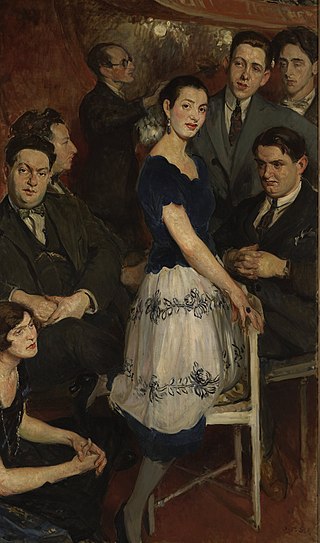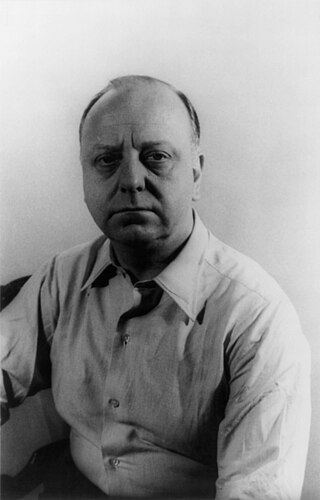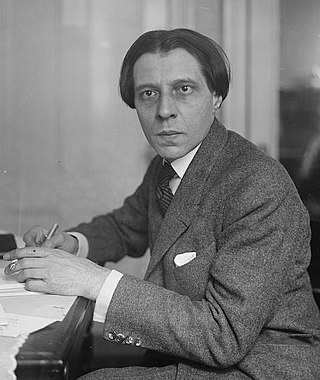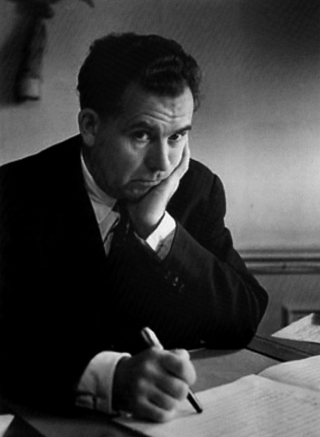
"Les Six" is a name given to a group of six composers, five of them French and one Swiss, who lived and worked in Montparnasse. The name has its origins in two 1920 articles by critic Henri Collet in Comœdia. Their music is often seen as a neoclassic reaction against both the musical style of Richard Wagner and the Impressionist music of Claude Debussy and Maurice Ravel.

Olivier Eugène Prosper Charles Messiaen was a French composer, organist, and ornithologist. One of the major composers of the 20th century, he was also an outstanding teacher of composition and musical analysis.

Virgil Thomson was an American composer and critic. He was instrumental in the development of the "American Sound" in classical music. He has been described as a modernist, a neoromantic, a neoclassicist, and a composer of "an Olympian blend of humanity and detachment" whose "expressive voice was always carefully muted" until his late opera Lord Byron which, in contrast to all his previous work, exhibited an emotional content that rises to "moments of real passion".

Alfred Denis Cortot was a French pianist, conductor, and teacher who was one of the most renowned classical musicians of the 20th century. A pianist of massive repertory, he was especially valued for his poetic insight into Romantic piano works, particularly those of Chopin, Franck, Saint-Saëns and Schumann. For Éditions Durand, he edited editions of almost all piano music by Chopin, Liszt and Schumann.

The Conservatoire de Paris, also known as the Paris Conservatory, is a college of music and dance founded in 1795. Officially known as the Conservatoire National Supérieur de Musique et de Danse de Paris (CNSMDP), it is situated in the avenue Jean Jaurès in the 19th arrondissement of Paris, France. The Conservatoire offers instruction in music and dance, drawing on the traditions of the 'French School'.

André Jolivet was a French composer. Known for his devotion to French culture and musical thought, Jolivet drew on his interest in acoustics and atonality, as well as both ancient and modern musical influences, particularly on instruments used in ancient times. He composed in a wide variety of forms for many different types of ensembles.
Post-romanticism or Postromanticism refers to a range of cultural endeavors and attitudes emerging in the late nineteenth and early twentieth centuries, after the period of Romanticism.

Jean-Louis Tixier-Vignancour was a French lawyer and far-right politician. Elected to the National Assembly in 1936, he initially collaborated with the Vichy regime before leaving for Tunisia in 1941. After a military court declared Tixier-Vignancour ineligible to hold public office for ten years for his early WWII activities, he joined the nationalist group Jeune Nation but left in 1954, opposed to their use of violence. He was re-elected to the Assembly in 1956, but lost his seat during the first legislative elections of the Fifth Republic.
Daniel Jean-Yves Lesur was a French organist and composer. He was the son of the composer Alice Lesur.

Jeune Nation was a French nationalist, neo-Pétainist and neo-fascist far-right movement founded in 1949 by Pierre Sidos and his brothers. Inspired by Fascist Italy and Vichy France, the group attracted support from many young nationalists during the Algerian war (1954–62), especially in the French colonial army. Promoting street violence and extra-parliamentarian insurrection against the Fourth Republic, members hoped the turmoils of the wars of decolonization would lead to a coup d'état followed by the establishment of a nationalist regime. Jeune Nation was the most significant French neo-fascist movement during the 1950s; it gathered at its height 3,000 to 4,000 members.

Marie Louis Emmanuel Bernard Faÿ was a French historian of Franco-American relations, an anti-Masonic polemicist who believed in a worldwide Jewish-Freemason conspiracy. During World War II he was an official for Vichy France.

Vichy France, officially the French State, was the French rump state headed by Marshal Philippe Pétain during World War II. It was named after its seat of government, the city of Vichy. Officially independent, but with half of its territory occupied under the harsh terms of the 1940 armistice with Nazi Germany, it adopted a policy of collaboration. Though Paris was nominally its capital, the government established itself in the resort town of Vichy in the unoccupied "free zone", where it remained responsible for the civil administration of France as well as its colonies. The occupation of France by Nazi Germany at first affected only the northern and western portions of the country, but in November 1942 the Germans and Italians occupied the remainder of Metropolitan France, ending any pretence of independence by the Vichy government.

La Nativité du Seigneur, neuf méditations pour orgue is a work for organ, written by the French composer Olivier Messiaen in 1935 in Grenoble.
Trois Petites Liturgies de la Présence Divine is a cantata by Olivier Messiaen for women's voices, piano solo, onde Martenot, percussion battery, and small string orchestra, in three movements. Its libretto was written by Messiaen himself, who composed the work from 1943 to 1944.

Pierre Sidos was a French far right nationalist, neo-Pétainist, and antisemitic activist. One of the main figures of post-WWII nationalism in France, Sidos was the founder and leader of the nationalist organizations Jeune Nation (1949–1958) and L'Œuvre Française (1968–2013).
Pierre Ancelin was a French composer.

Elsa Jacqueline Barraine was a composer of French music in the time after the neoclassicist movement of Les Six, Ravel, and Stravinsky. Despite being considered “one of the outstanding French composers of the mid-20th century,” Barraine's music is seldom performed today. She won the Prix de Rome in 1929 for La vierge guerrière, a sacred trilogy named for Joan of Arc, and was the fourth woman ever to receive that prestigious award.
French electronic music is a panorama of French music that employs electronic musical instruments and electronic music technology in its production.

The French National-Collectivist Party, originally known as the French National Communist Party, was a minor political group active in the French Third Republic and reestablished in occupied France. Its leader in both incarnations was the sports journalist Pierre Clémenti. It espoused a "national communist" platform noted for its similarities with fascism, and popularized racial antisemitism. The group was also noted for its agitation in support of pan-European nationalism and rattachism, maintaining contacts in both Nazi Germany and Wallonia.
Yves Marie Baudrier was a French composer. Along with André Jolivet, Olivier Messiaen and Jean-Yves Daniel-Lesur, he was a founder of the La jeune France group of composers.